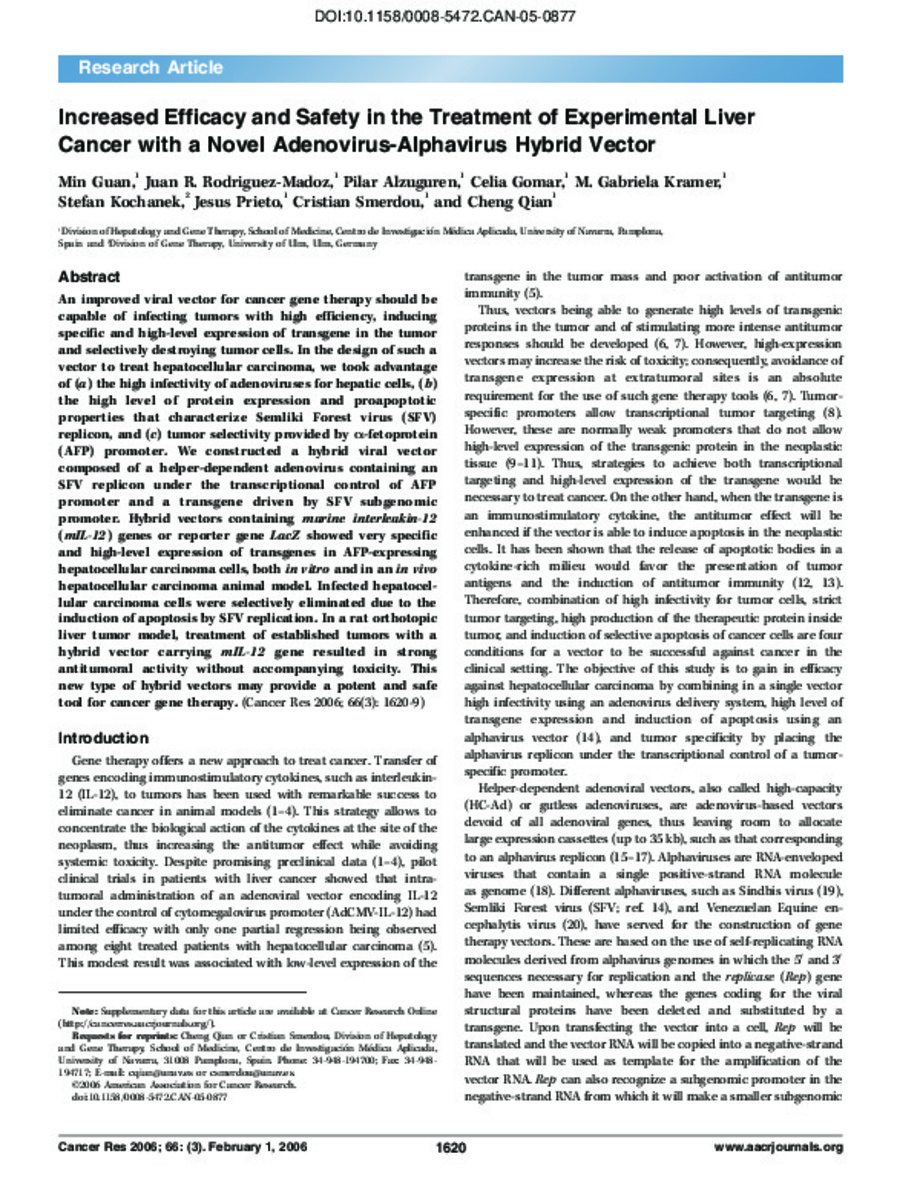Full metadata record
| DC Field | Value | Language |
|---|---|---|
| dc.creator | Guan, M. (Min) | - |
| dc.creator | Rodriguez-Madoz, J.R. (Juan Roberto) | - |
| dc.creator | Alzuguren, P. (Pilar) | - |
| dc.creator | Gomar, C. (Celia) | - |
| dc.creator | Kramer, M.G. (María Gabriela) | - |
| dc.creator | Kochanek, S. (Stefan) | - |
| dc.creator | Prieto, J. (Jesús) | - |
| dc.creator | Smerdou, C. (Cristian) | - |
| dc.creator | Qian, C. (Cheng) | - |
| dc.date.accessioned | 2012-10-08T07:51:56Z | - |
| dc.date.available | 2012-10-08T07:51:56Z | - |
| dc.date.issued | 2006 | - |
| dc.identifier.citation | Guan M, Rodriguez-Madoz JR, Alzuguren P, Gomar C, Kramer MG, Kochanek S, et al. Increased efficacy and safety in the treatment of experimental liver cancer with a novel adenovirus-alphavirus hybrid vector. Cancer Res 2006 Feb 1;66(3):1620-1629. | es_ES |
| dc.identifier.issn | 1538-7445 | - |
| dc.identifier.uri | https://hdl.handle.net/10171/23301 | - |
| dc.description.abstract | An improved viral vector for cancer gene therapy should be capable of infecting tumors with high efficiency, inducing specific and high-level expression of transgene in the tumor and selectively destroying tumor cells. In the design of such a vector to treat hepatocellular carcinoma, we took advantage of (a) the high infectivity of adenoviruses for hepatic cells, (b) the high level of protein expression and proapoptotic properties that characterize Semliki Forest virus (SFV) replicon, and (c) tumor selectivity provided by alpha-fetoprotein (AFP) promoter. We constructed a hybrid viral vector composed of a helper-dependent adenovirus containing an SFV replicon under the transcriptional control of AFP promoter and a transgene driven by SFV subgenomic promoter. Hybrid vectors containing murine interleukin-12 (mIL-12) genes or reporter gene LacZ showed very specific and high-level expression of transgenes in AFP-expressing hepatocellular carcinoma cells, both in vitro and in an in vivo hepatocellular carcinoma animal model. Infected hepatocellular carcinoma cells were selectively eliminated due to the induction of apoptosis by SFV replication. In a rat orthotopic liver tumor model, treatment of established tumors with a hybrid vector carrying mIL-12 gene resulted in strong antitumoral activity without accompanying toxicity. This new type of hybrid vectors may provide a potent and safe tool for cancer gene therapy. | es_ES |
| dc.language.iso | eng | es_ES |
| dc.publisher | American Association for Cancer Research | es_ES |
| dc.rights | info:eu-repo/semantics/openAccess | es_ES |
| dc.subject | Adenoviridae/genetics | es_ES |
| dc.subject | Carcinoma, Hepatocellular/therapy | es_ES |
| dc.subject | Gene Therapy/methods | es_ES |
| dc.subject | Liver Neoplasms/therapy | es_ES |
| dc.subject | Semliki forest virus/genetics | es_ES |
| dc.title | Increased efficacy and safety in the treatment of experimental liver cancer with a novel adenovirus-alphavirus hybrid vector | es_ES |
| dc.type | info:eu-repo/semantics/article | es_ES |
| dc.relation.publisherversion | http://cancerres.aacrjournals.org/content/66/3/1620 | es_ES |
| dc.type.driver | info:eu-repo/semantics/article | es_ES |
Files in This Item:
Statistics and impact
Items in Dadun are protected by copyright, with all rights reserved, unless otherwise indicated.






